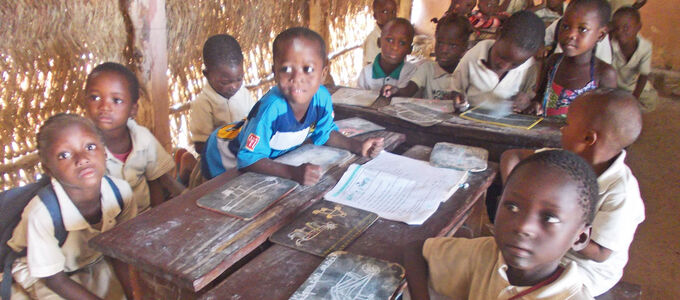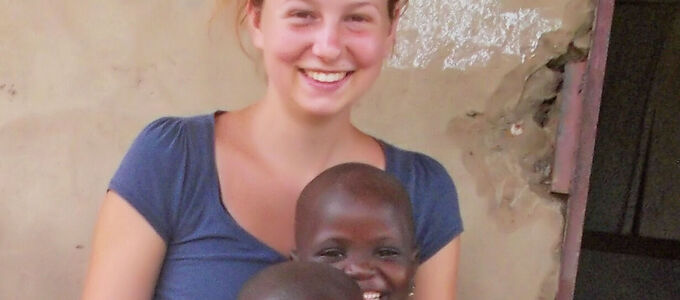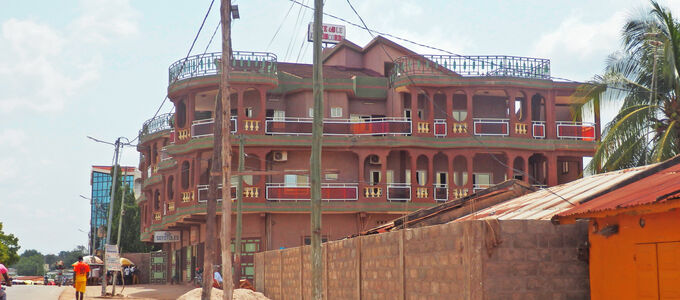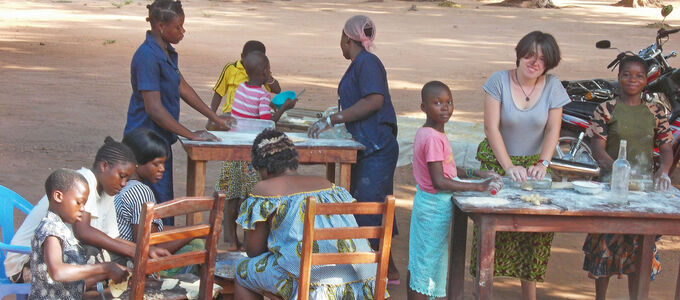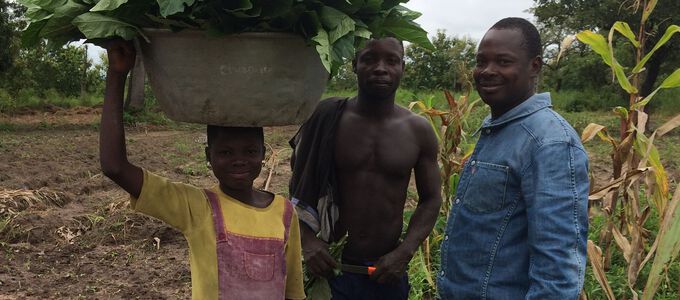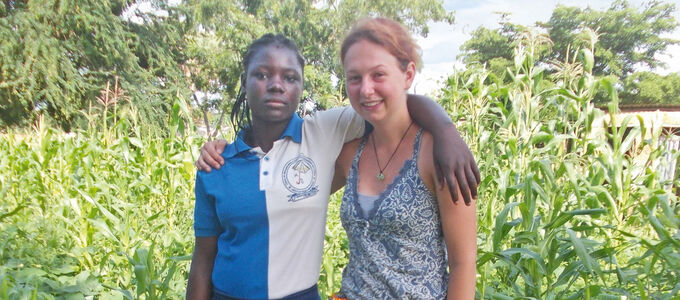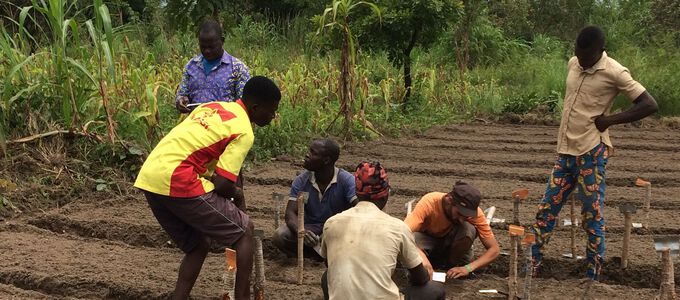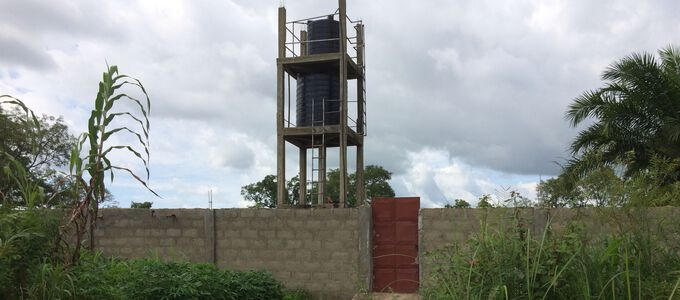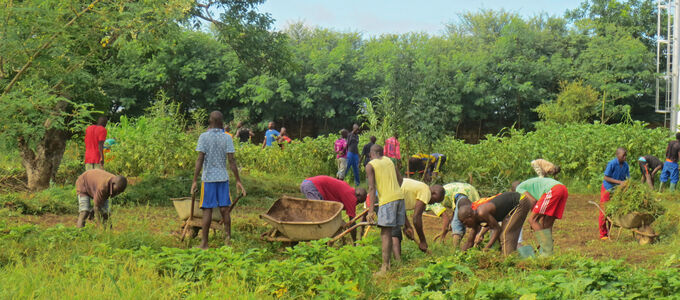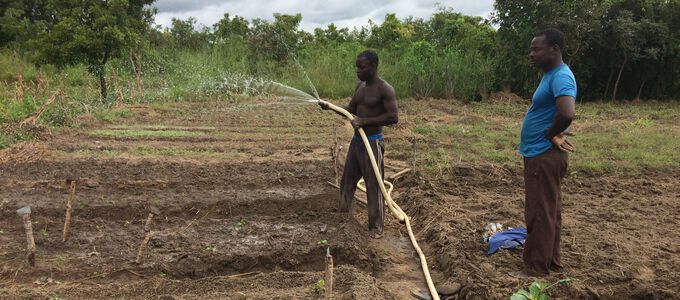Slogging away for the future, preferably in Africa

From Togo to Austria and back. Laura Johanna Fischer lives in two worlds. Several times a year, the 27-year-old travels to the African continent to advance her heart’s project there. This is still a tender plant and needs a lot of care.
Laura is on her scooter riding through the city of Kara in Togo. She stands out with her white skin and is always asked for money and surrounded by children. But Laura is used to that by now, she is now in her second volunteer year for a German children’s aid society called Kinderhilfe Westafrika e.V.
Something else catches her attention: she sees the emblem of the New Apostolic Church. The next Sunday she drives to the building and it turns out that not only does the emblem fit, but so do the service times.
Answering the call of Africa
Already a year before graduating from high school it was clear to Laura that she would go to Africa. Just as others were drawn to Australia or New Zealand, she was drawn to this continent.
She applied to the aid organisation, which sent her to Benin. She began her volunteer service in Tanguiéta in the north of the country. Here she taught orphans in a private Protestant school.
Many things in Africa were different from what she was used to at home. The landscape, the culture, the poverty, but also the intense togetherness. “Being able to be part of a community is one of the most important things in Africa, as it is also a safeguard. Community living makes life more vibrant and richer,” Laura tells us.
Experiencing faith anew
She was also able to attend some divine services in the New Apostolic Church, even one with Chief Apostle Jean-Luc Schneider in Porto Novo, the capital of Benin. “I experienced my faith differently there, more profoundly perhaps, and I realised just how important it is to have faith in God,” she says.
She liked Africa so much that she did not want to come back. She extended her volunteer service and worked in Taiacou at an orphanage.
Between two worlds
Back in Germany eventually, Laura experienced a culture shock. “They’re two completely different worlds,” she says. “At first, I couldn’t even look out the window while riding in the car with someone. Too many cars going way too fast, huge construction sites, and huge buildings.” It took her six months to find her feet again in Germany. And she wanted to go right back.
But being on vacation there is not the same. And live there? Rather difficult. “You can integrate as well as you want, but you realise the cultural understanding is different after all. I sometimes missed that exchange there.”
From the neem tree to twenty-four acres
Laura is back in Burkina Faso for her bachelor’s thesis . Her topic is: “The neem tree as a natural insecticide in vegetable production (using cucumber and zucchini as examples)”. In the process, Laura noticed that the Africans make the same mistakes in agriculture as the Europeans do.
“Europe is a role model there,” Laura says. “And instead of avoiding our mistakes, the exact same thing is being done there.” That is why the idea is maturing in her mind to push organic farming there now, while the soils are still good. Together with the local project leader Essodigue Igor Harenga, she bought a 24-acre plot of land near Koboyo in Togo, where they grow cassava, yams, millet, sweet potatoes, and much more.
The project is Laura’s purpose in life. Several times a year she flies from Bregenz in Austria, where she now works in an organic food store, to Africa and brings back organic seeds. She puts all her money into it. The project still depends on donations. For example, the relief organisation of the New Apostolic Church Southern Germany, human aktiv, provided the funds for a solar well.
She would like the project to be self-sustaining soon. Through the harvesting of the vegetables and the processing of food, but also through ecotourism—that is, when others come to their farm to learn more about the project from her. Ultimately, the long-term goal is for more people to grow their crops organically.
The Church feels like home
She loves to attend church services in Lomé or Sokodé, which she usually understands quite well because she took French at school. And if she does not understand anything because the sermon is in Ewe, Mina, or Kabiyé, then she just sits there. “But that is fine,” she says. The liturgy is the same, the faith is the same, and the songs are the same. “There is a lot of singing in the local language which is accompanied by drums.”
When asked where she likes it better, she clearly answers Africa. Europe, however, offers better spare time opportunities. “Recreational sports don’t really exist in Africa yet. It is starting to happen slowly in the big cities, but in the villages people give you funny looks when you put on your running shoes to go jogging.”







